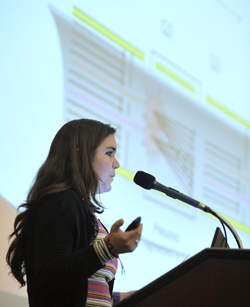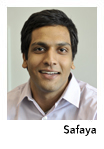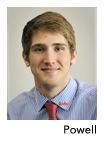Ole Miss Undergrads Gain Biomedical Research Experience in Summer Program at UMMC

Rhea Kay Rowe, Charles Powell and Eshan Safaya were among more than 60 undergraduate students who worked in UMMC laboratories over the summer.
All three were in the Summer Undergraduate Research Experience, or SURE, a program sponsored by the UM School of Graduate Studies in the Health Sciences, which is based at UMMC.
SURE gives students 10 weeks of hands-on biomedical research, training on basic laboratory techniques and equipment, and Friday lunchtime discussions on career paths by Medical Center faculty and post-doctoral fellows. It also pays a $3,500 stipend.
 “This is our main recruiting effort for the Graduate School. We put a great deal of effort into making certain that students take away a positive scientific experience,” said Dr. Joey Granger, distinguished professor of physiology and graduate school dean.
“This is our main recruiting effort for the Graduate School. We put a great deal of effort into making certain that students take away a positive scientific experience,” said Dr. Joey Granger, distinguished professor of physiology and graduate school dean.
The program ended Aug. 3 with a half-day symposium where each student presented his or her research in front of the other students, laboratory technicians, mentors and faculty members.
 Mary Canterbury, SURE program director, said the caliber of students was very high this year and a number of young, scientific minds came away interested in the school’s masters and doctoral programs.
Mary Canterbury, SURE program director, said the caliber of students was very high this year and a number of young, scientific minds came away interested in the school’s masters and doctoral programs.
Powell, a sophomore exercise science major and fitness buff, worked on a heart-failure project in the laboratory of Dr. George Booz, associate professor of pharmacology and toxicology.
In the research, Powell used two models, one of a normal cardiovascular system, the other of a system with a certain signaling protein, STAT3, deleted. After creating high blood pressure in both systems, Powell and other researchers in the lab compared outcomes between the two models.
During the summer he dove into research publications, reading and deciphering papers to better understand the mechanisms behind the research he was doing.
“Really, I wanted to understand the science at a usable level,” Powell said.
At the start of her sophomore year, Rowe, a chemistry major from Brandon, thought she might apply to medical school. A year later and with 10 weeks of hands-on research accomplished, she’s now leaning toward graduate school.
“I’m interested in the details of science, which I don’t think I would get in medical school,” she said.
Working on a kidney disease project with Dr. Stanley Smith, UMMC assistant professor of pharmacology and toxicology, Rowe prepared and tested urine samples from about 150 patients. She helped analyze the samples using mass spectrometry then used software to quantify levels of arachidonic acid metabolites. Those quantifications can help researchers identify biomarkers that predict risk factors for chronic kidney disease progression.
“It’s been really great and I’ve learned a lot,” Rowe said of her time in the SURE program. “The Friday seminars exposed us to different departments and career possibilities.”
Safaya, a first-year pharmacy post-graduate and Jackson native, worked under Dr. Parminder Vig, UMMC professor of neurology, in a laboratory he’s quite familiar with.
It was Safaya’s second summer in SURE and his fifth year at UMMC. As a Murrah High School student, he participated in a research program that paired him with Vig.
Safaya researched spinocerebellar ataxia type 1 (SCA1), a neurodegenerative disease that degrades Purkinje neurons in the cerebellum and leads to difficulty coordinating motor functions and balance. Safaya and the lab’s scientists analyzed the effectiveness of different peptide-based treatments and how each treatment works different stages of the SCA1 disease.
“SURE is a great experience, especially the second time around. Your mentor seems more confident in your ability and skills and you can jump right into your research. Basically, you get to do things a graduate student does, but in your undergraduate years,” Safaya said.
About 64 students participated in undergraduate research activities at UMMC this summer. The SURE program accepted 33 students out of 130 applicants. The remaining 31 students were enrolled in various other summer programs on campus.
For more information on SURE, go to graduate-school.umc.edu/SummerResearch.html
All three were in the Summer Undergraduate Research Experience, or SURE, a program sponsored by the UM School of Graduate Studies in the Health Sciences, which is based at UMMC.
SURE gives students 10 weeks of hands-on biomedical research, training on basic laboratory techniques and equipment, and Friday lunchtime discussions on career paths by Medical Center faculty and post-doctoral fellows. It also pays a $3,500 stipend.
 “This is our main recruiting effort for the Graduate School. We put a great deal of effort into making certain that students take away a positive scientific experience,” said Dr. Joey Granger, distinguished professor of physiology and graduate school dean.
“This is our main recruiting effort for the Graduate School. We put a great deal of effort into making certain that students take away a positive scientific experience,” said Dr. Joey Granger, distinguished professor of physiology and graduate school dean.The program ended Aug. 3 with a half-day symposium where each student presented his or her research in front of the other students, laboratory technicians, mentors and faculty members.
 Mary Canterbury, SURE program director, said the caliber of students was very high this year and a number of young, scientific minds came away interested in the school’s masters and doctoral programs.
Mary Canterbury, SURE program director, said the caliber of students was very high this year and a number of young, scientific minds came away interested in the school’s masters and doctoral programs. Powell, a sophomore exercise science major and fitness buff, worked on a heart-failure project in the laboratory of Dr. George Booz, associate professor of pharmacology and toxicology.
In the research, Powell used two models, one of a normal cardiovascular system, the other of a system with a certain signaling protein, STAT3, deleted. After creating high blood pressure in both systems, Powell and other researchers in the lab compared outcomes between the two models.
During the summer he dove into research publications, reading and deciphering papers to better understand the mechanisms behind the research he was doing.
“Really, I wanted to understand the science at a usable level,” Powell said.
At the start of her sophomore year, Rowe, a chemistry major from Brandon, thought she might apply to medical school. A year later and with 10 weeks of hands-on research accomplished, she’s now leaning toward graduate school.
“I’m interested in the details of science, which I don’t think I would get in medical school,” she said.
Working on a kidney disease project with Dr. Stanley Smith, UMMC assistant professor of pharmacology and toxicology, Rowe prepared and tested urine samples from about 150 patients. She helped analyze the samples using mass spectrometry then used software to quantify levels of arachidonic acid metabolites. Those quantifications can help researchers identify biomarkers that predict risk factors for chronic kidney disease progression.
“It’s been really great and I’ve learned a lot,” Rowe said of her time in the SURE program. “The Friday seminars exposed us to different departments and career possibilities.”
Safaya, a first-year pharmacy post-graduate and Jackson native, worked under Dr. Parminder Vig, UMMC professor of neurology, in a laboratory he’s quite familiar with.
It was Safaya’s second summer in SURE and his fifth year at UMMC. As a Murrah High School student, he participated in a research program that paired him with Vig.
Safaya researched spinocerebellar ataxia type 1 (SCA1), a neurodegenerative disease that degrades Purkinje neurons in the cerebellum and leads to difficulty coordinating motor functions and balance. Safaya and the lab’s scientists analyzed the effectiveness of different peptide-based treatments and how each treatment works different stages of the SCA1 disease.
“SURE is a great experience, especially the second time around. Your mentor seems more confident in your ability and skills and you can jump right into your research. Basically, you get to do things a graduate student does, but in your undergraduate years,” Safaya said.
About 64 students participated in undergraduate research activities at UMMC this summer. The SURE program accepted 33 students out of 130 applicants. The remaining 31 students were enrolled in various other summer programs on campus.
For more information on SURE, go to graduate-school.umc.edu/SummerResearch.html


